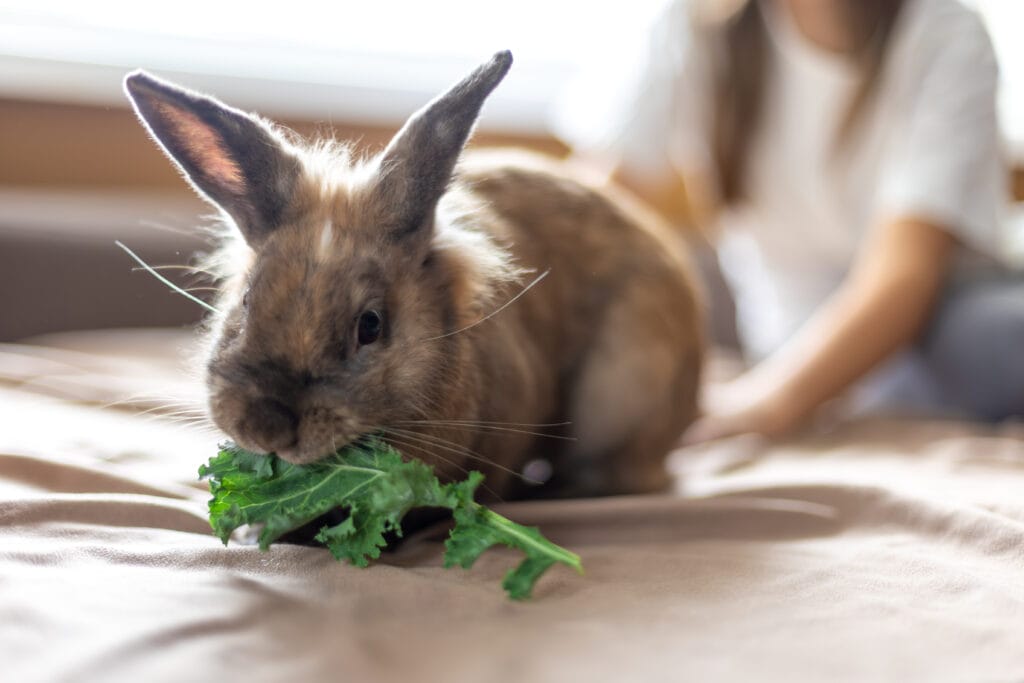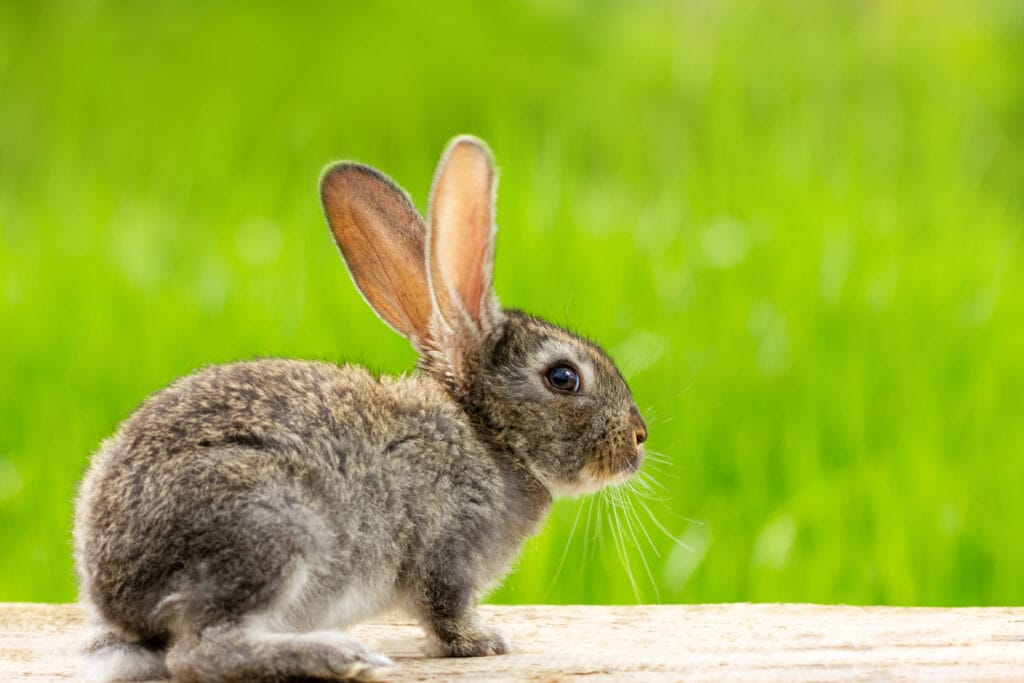Can bunnies have spinach? At Tedbun, we understand how much you want to keep your furry friend healthy and happy with delicious foods. Those vibrant spinach leaves look like a perfect addition to a rabbit’s diet, sparking questions from many owners. The question is common, and for good reason—spinach is packed with nutrients, but is it safe for rabbits? In this article, we’ll explore whether rabbits eat spinach, the benefits and risks of feeding it, and how to do it safely to keep your bunny hopping with joy
Is Spinach Safe for Rabbits?
When you think about feeding your bunny, you might wonder,
“Can rabbits eat spinach?”
The short answer is yes,
rabbits can eat spinach, but it comes with some important considerations. Leafy greens are a key part of a rabbit’s diet because they provide essential nutrients and help maintain healthy digestion. Spinach is one such green, but it’s not a food you can offer without care. While bunnies can have spinach, it must be given in moderation due to potential health risks. Let’s break down what makes spinach a safe—or risky—choice for your rabbit.
What Makes Spinach Safe (or Not)?
To answer “Can bunnies eat spinach?” fully, we need to look at what’s in it. Spinach is loaded with nutrients that can benefit rabbits. It contains vitamins A, C, and K, which support eye health, immune function, and blood clotting. It also has fiber, which is great for a rabbit’s digestive system, and small amounts of minerals like iron and calcium. These nutrients make bunny spinach a tempting treat, but there’s a catch: spinach contains oxalates, naturally occurring compounds that can pose risks for rabbits if overconsumed.
Oxalates can bind with calcium in a rabbit’s body, potentially leading to bladder stones or kidney problems. This is why questions like “Can rabbits have spinach?” often come with warnings about moderation. Compared to other leafy greens, spinach has higher oxalate levels than options like romaine lettuce or cilantro but lower levels than kale or chard. For example, can rabbits eat chard? Yes, but like spinach, chard is high in oxalates and should be limited. On the other hand, can rabbits eat arugula? Absolutely—arugula is lower in oxalates, making it a safer frequent choice. Understanding these differences helps you decide how to include spinach in your rabbit’s diet safely.

Benefits of Feeding Spinach to Rabbits
So, why consider spinach for your bunny? When you ask, “Does rabbit eat spinach?” the answer is yes, and there are good reasons to include it in small amounts. Spinach offers several benefits when fed correctly:
- Digestive Health: The fiber in spinach supports a rabbit’s sensitive digestive system, helping prevent issues like constipation.
- Eye and Immune Support: Vitamins A and C promote healthy vision and a strong immune system, keeping your bunny vibrant.
- Diet Variety: Offering spinach alongside other greens adds excitement to your rabbit’s meals, preventing boredom.
- Tasty Treat: Rabbits eat spinach willingly because of its mild flavor, making it a great way to reward your bunny.
These benefits make spinach a nutritious addition, but only if you follow safe feeding practices. Can bunnies have spinach as a treat? Yes, but it’s all about balance.

Risks of Feeding Spinach to Rabbits
While spinach has benefits, there are risks to consider when asking, “Can rabbits eat spinach?” The primary concern is oxalates, which can accumulate in a rabbit’s body if spinach is overfed. This can lead to serious health issues, such as:
- Bladder Stones: Excess oxalates can form calcium-based stones in the bladder or kidneys, causing pain and urinary problems.
- Digestive Upset: Too much spinach may cause soft stools or diarrhea, especially if introduced suddenly.
- Reduced Appetite: Overfeeding spinach can fill your bunny up, reducing their intake of hay, which is the cornerstone of their diet.
Signs of overfeeding include lethargy, changes in droppings, or decreased hay consumption. To avoid these risks, moderation is key. Can rabbits have spinach every day? No—feeding it too often increases the risk of oxalate-related issues. Instead, limit spinach to a small, occasional treat.
Oxalates: A Closer Look
To fully answer “Can bunnies eat spinach?” we need to dive deeper into oxalates. These compounds are found in many leafy greens, but spinach has a higher concentration than safer options like romaine lettuce. In rabbits, oxalates can bind with calcium, forming crystals that may lead to urinary tract issues or kidney damage over time. Symptoms of oxalate toxicity include:
- Difficulty urinating or blood in the urine.
- Lethargy or discomfort.
- Reduced appetite or refusal to eat.
To minimize these risks, follow these tips:
- Rotate Greens: Alternate spinach with low-oxalate greens like cilantro, parsley, or arugula. Can rabbits eat arugula? Yes, it’s a great low-oxalate option.
- Portion Control: Stick to small servings to keep oxalate intake low.
- Monitor Health: Watch for changes in your rabbit’s behavior or bathroom habits after feeding spinach.
By being cautious, you can safely include bunny spinach in your rabbit’s diet without worry.
How to Feed Spinach to Your Bunny
Now that we’ve answered “Can bunnies have spinach?” let’s talk about how to feed it properly. Here are the key guidelines:
- Serving Size: Offer 1-2 small spinach leaves per 4-5 pounds of body weight, no more than 1-2 times per week. For a 5-pound rabbit, this means a couple of leaves once or twice weekly.
- Frequency: Spinach should not be a daily food. Overfeeding increases oxalate risks, so space out servings.
- Preparation: Always wash spinach thoroughly to remove pesticides or dirt. Serve it fresh and raw—cooked spinach is harder for rabbits to digest. Does rabbit eat spinach raw or cooked? Always raw, as cooking alters its nutritional profile and digestibility.
These steps ensure your rabbit enjoys spinach safely. Can rabbits eat spinach without issues? Yes, if you follow these guidelines carefully.
Mixing Spinach with Other Vegetables
One way to make spinach safer is to mix it with other vegetables. Combining spinach with low-oxalate greens reduces the overall oxalate load while adding variety to your rabbit’s diet. For example:
- Cilantro and Parsley: These are low in oxalates and add a fresh flavor bunnies love.
- Romaine Lettuce: A safe, low-oxalate staple that balances spinach’s richness.
- Arugula: Can rabbits eat arugula? Yes, it’s a low-oxalate green that complements spinach well.
A sample vegetable mix might include one spinach leaf, a sprig of cilantro, and a few arugula leaves. This mix provides nutrition without overloading on oxalates. When introducing new veggies, do so gradually to avoid digestive upset. Start with a small portion and monitor your bunny’s reaction over 24-48 hours. Can rabbits eat chard in a mix? Yes, but like spinach, chard is high in oxalates, so use it sparingly.
Alternatives to Spinach for Rabbits
If you’re hesitant about spinach or want to diversify your bunny’s diet, there are plenty of safe alternatives. Variety is important because it keeps your rabbit interested and ensures a balanced intake of nutrients. Here are some great options:
- Romaine Lettuce: Low in oxalates, high in fiber, and a rabbit favorite.
- Arugula: Can rabbits eat arugula? Yes, it’s low in oxalates and has a peppery flavor bunnies enjoy.
- Chard: Can rabbits eat chard? Yes, but like spinach, it’s high in oxalates, so limit its use.
- Bok Choy: A crunchy, low-oxalate green that’s safe for frequent feeding.
- Celery: Use the leaves and stalks in small amounts for variety.
- Cucumber: A hydrating treat, but feed sparingly due to its high water content.
These alternatives keep your rabbit’s diet exciting and healthy. If you’re curious about other safe veggies, check out Tedbun’s posts on rabbit nutrition (if available) for more ideas. Can rabbits spinach be replaced entirely? Yes, if you prefer lower-oxalate greens to minimize risks.
Tips for Introducing Spinach to Your Rabbit’s Diet
If you’re ready to try spinach, introduce it carefully to avoid upsetting your bunny’s sensitive stomach. Here’s how:
- Start Small: Begin with half a spinach leaf and observe your rabbit for 24-48 hours. Check for changes in droppings or behavior.
- Monitor Reactions: Look for signs of digestive upset, like soft stools or reduced appetite. If these occur, stop feeding spinach and consult a vet.
- Consult a Vet: If your rabbit has a history of urinary issues, ask a rabbit-savvy veterinarian before adding spinach. They can advise based on your bunny’s health.
These steps ensure your rabbit enjoys spinach safely. Can bunnies eat spinach without preparation? No—always wash it and introduce it slowly.
FAQs About Rabbits and Spinach
Here are answers to common questions about feeding spinach to rabbits:
- Can rabbits eat spinach every day?
No, spinach should be limited to 1-2 times per week due to its high oxalate content. Overfeeding can lead to health issues. - Does rabbit eat spinach raw or cooked?
Rabbits eat spinach raw. Cooked spinach is harder to digest and less nutritious for bunnies. - Can rabbits eat chard or arugula?
Yes, rabbits can eat chard and arugula. Arugula is low in oxalates and safe for more frequent feeding, while chard, like spinach, should be given sparingly. - What happens if my bunny eats too much spinach?
Overfeeding spinach can cause digestive issues like diarrhea or oxalate-related problems like bladder stones. - What’s the best way to feed spinach to bunnies?
Wash spinach thoroughly, serve 1-2 small leaves per 4-5 pounds of body weight, and mix with low-oxalate greens like cilantro or arugula. - Can rabbits eat raw spinach?
Yes, rabbits can eat raw spinach, and it’s the only safe way to feed it. Raw spinach retains its nutrients and is easier for rabbits to digest. - What greens can rabbits not eat?
Rabbits should avoid greens like iceberg lettuce, which lacks nutrients and can cause diarrhea, and rhubarb leaves, which are toxic. - Does spinach make bunnies gassy?
Spinach can cause gas in some bunnies if overfed or introduced too quickly. Feed small amounts and monitor for bloating. - What leaves can my rabbit not eat?
Rabbits should not eat leaves from rhubarb, potato, or tomato plants, as these are toxic and can cause serious illness.
Conclusion
So, can bunnies have spinach? Absolutely, but it’s all about feeding it the right way. Spinach can be a nutritious treat when given in small amounts, 1-2 times per week, and mixed with low-oxalate greens like arugula or romaine lettuce. By being mindful of portion sizes, preparation, and variety, you can keep your rabbit healthy and happy. At Tedbun, we’re passionate about helping you care for your furry friend. Have questions about bunny spinach or other veggies? Share them in the comments below, and let’s keep the conversation hopping!
Call to Action
Love learning about rabbit care? Sign up for the Tedbun newsletter to get the latest tips and tricks delivered to your inbox. Let’s keep your bunny hopping with joy!
Credit:Tahira Jabeen


